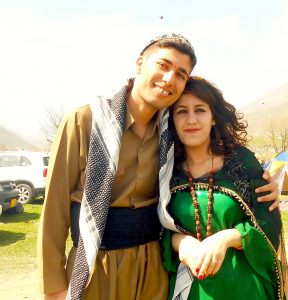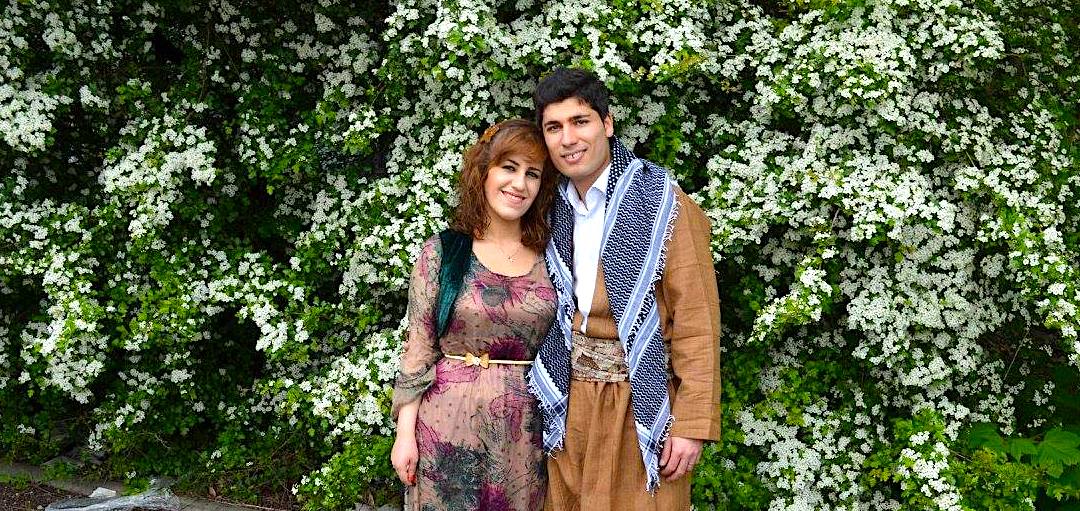3,407 Total views, 3 Views today
Nabaz Samad
Written in 2014
Dear Khanda, today (14/4/2014) is the 26th anniversary of the Anfal Campaign (Genocide). In February 1988 the Anfal (meaning ”spoils of war”) campaign as the final solution of the Kurdish question in Iraq was carried out by the toppled dictatorship of Iraq. It was the Ba’ath regime’s vicious attempt for “solving” the Kurdish problem once and for all. The Anfal campaign took six and a half months in eight stages, targeting the Kurdish rural areas. The attacks began with chemical poison gases to terrify and kill as well as to ruin the morale of the people. Then the ground attacks began, and civilians were taken in the military vehicles (IFA trucks) and tractors, in order to transfer them to the concentration camps, such as Topzawa, Nugrasalman, Qala’t, and Nizarka.

In the camps they were divided into three major groups: the women and children, the men and teenage boys, and the elderly. The men were immediately selected for annihilation, and transferred to shooting fields. After being shot they were buried in the mass graves with bulldozers in the Iraqi deserts.
Personally, I have been affected directly by the Anfal. In other words, genocide. My father was ”anfalised” in the 1988 Anfal campaign, after which he transferred to a concentration camp where he was shot like many other Kurds. He was buried (by a bulldozer) in one of the mass graves in the deserts of southern or central of Iraq. I have never seen my father because I was only three months when he was anfalised.
When I was a child, I played with other children from my local neighborhood. Most of them have fathers, except me and two or three other children whose fathers were anafalised, too. The absence of my father became a big question for me. I asked my mother and myself continuously: where is my father? Why does he not return? Why do I have no father? Why is my father just a photograph on the wall? Why does he never hold my hand? Why does he never take me to a shop to buy some biscuits, sweets, and snacks, like the other fathers do? My mother replied: “Your father was anfalised”, but I did not understand what this means, I did not understand why my father was anfalised by the Ba’ath regime. Now I have grown up, I understand what Anfal is, but I still ask myself: “why did the Anfal happen in the first place?”
Dear Khanda, this leads me to have different feelings about the horrific massacres of Anfal. I have mixed feelings. On the one hand, I have negative feelings, as you know, concerning our society which is a patriarchal one. Having a father (as a head of a family) is power, sanctuary, cover, and shelter – because he protects you and you will not be a weak target for patriarchal and tribal hegemony. Hence, the experience of being fatherless (”Hatiw” a Kurdish word for fatherless) includes weakness, fear, distrust, and lack of self-confidence, because the others make you feel your flaws and deficiency, and they imbue you with powerlessness when they look at you as ”Hatiw” (fatherless). This turns you into trouble. In both a patriarchal and tribal society fatherlessness means bareness, homeless, insecurity and vulnerability. Therefore, the others can beat you hallow, and abuse you easily. Here, your very existence is at stake.
In any case, the fatherlessness makes you feel lonely, strange, and alienated as well as making you feel a lack of sympathy from a father, and you see yourself as a scapegoat. Such things make people having mercy on you. However, most of the time the mercy is full of unkindness, disrespect, humiliation, etc.
On the other hand, fatherlessness makes you stronger. As Friedrich Nietzsche says: ”That which does not kill us, make us stronger.” Fatherlessness does not kill me, but it makes me stronger because it encourages me to challenge, resist, have competence, as well as to live, to continue, to survive and stand out against patriarchal hegemony and confrontation with the abusers.
Because of the absence of a father in my life, I have anchored with my mother. Therefore, as a matter of fact, I grow up with motherly feelings and sympathy. I have got a motherly education, which has been far-reaching for shaping my personality. I’m happy, in this regard, I have not experienced the ugly and unpleasant aspects of the Kurdish fatherhood. Here, I presume that it might be the children of the anfalised fathers that grow up with a motherly education, they have a calm, patient, and peaceful personality in comparison to those children who have grown up in the father dominated family.
Dear Khanda, you know how much I care about my mother and how much she means to me. I have learned many things from her, she does not let me feel a sense fatherlessness. Rather, she fills my father’s gap and she has infused me with optimism. Therefore, I do not see myself as ”Hatiw” (fatherless!). As you know, ”hatiw” in Kurdish is an accursed, nasty, and injurious word, it is full of scorn, degradation, and it is insulting.
Dear Khanda, my relationship with you in such a situation is more special and different. It means everything to me. After the Anfal and those unpleasant experiences, which is both insulting and humiliating, some people call us ”pashmaway Anfal” (the trash of Anfal). After all these insults, I survive and continue to live my life. In this loneliness and solitude (in particular, psychologically) I have fallen in love with you. As a son of an anfalised father, I have a different experience and understanding of love. My darling, have you ever asked yourself whether you are in a relationship with someone who has a genocidal experience? I do not know how you feel about that.
Dear Khanda, for me, being in love and in the relationship with you and our togetherness now, provides a fabulous, fascinating and special meaningfulness. Now I feel like I’m living, I feel that I have someone who loves me, who respects me. I feel that I have someone who shares her life with me under the same roof. For me, our togetherness means living, relief, continuing, and standing out against those troubles that I have faced throughout my life.
Dear Khanda, you make me feel stronger, you make me have dreams, and I attempt to make them true. I have a craving for your love. I love you so much.
Note: I have written this letter to my wife in Kurdish on (14/4/2014), for the 26th anniversary of the Anfal campaign.

